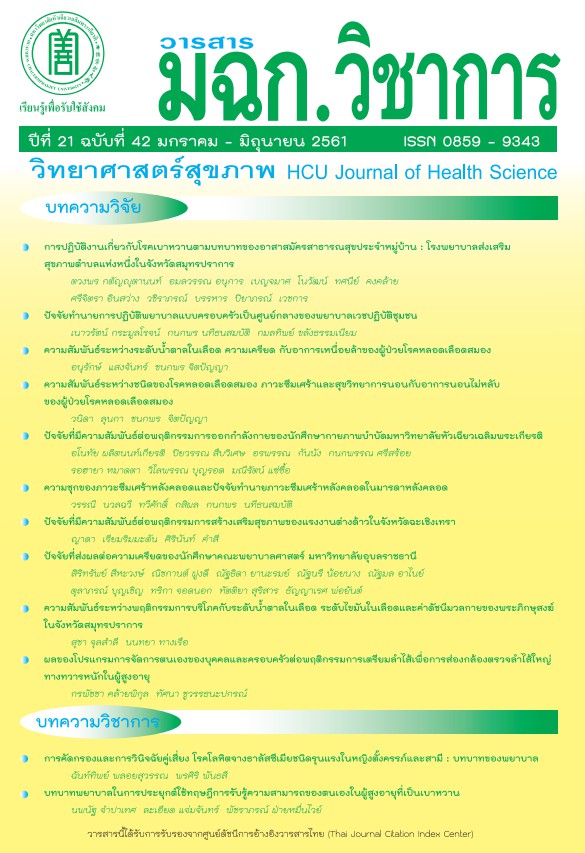The Relationship between Food Consumption Behavior, and Blood Sugar, Lipid Levels, AND Body Mass Index Among Monks in Samutprakarn Province
Keywords:
Consumption behavior, body mass index, monks, blood glucose, blood lipid levelAbstract
This study aimed to study monks’ health and food consumption behavior that may affect their health. Total of 283 monks from temples in five districts of Samutprakarn province participated in this study. All monks were subjected to 1) blood tests to assess the level of triglyceride, cholesterol, HDL-C and LDL-C 2) weight and height measurement to calculate BMI, and 3) respond to a series of questions. The study found that monks who had ordained for more than one year had higher blood sugar, triglyceride, cholesterol, HDL-C and LDL-C levels compared to those who had ordained less than one year. Moreover, statistical analysis on ordination period showed a significant difference between ordination period and blood sugar, and LDL-C (p= 0.012 and 0.033 respectively). Once, performing analysis on monks nutritional status by using body mass index (BMI), we found that 62.5% of monks had BMI ≥ 23.0 kg/m2, indicating that monks were more likely to be obese than the general male population. Moreover, there was also a significant difference between ordination period and body mass index. Statistical analysis also showed a significant positive relationship between body mass index and blood sugar (p= 0.000, r= 0.254), cholesterol (p= 0.000, r= 0.223), triglyceride (p= 0.000, r= 0.403), and LDL-C (p= 0.002, r=0.181) levels. However, body mass index showed a significant negative relationship with HDL-C level (p= 0.000, r= -0.307). When exploring the relationship between monk food consumption behavior, blood sugar and lipid levels, statistical analysis showed a significant negative relationship between consumption of soft drinks and cholesterol level (p= 0.014, r= -0.146) and LDL-C (p= 0.017, r= -0.144). Also, consumption of high fat foods showed a positive significant relationship with BMI (p= 0.043, r= 0.121). However, consumption of foods cooked with coconut milk; consumption of energy drinks, yogurt, fruit juices, sweetened milk, and sweet desserts, had no significant effect on blood sugar, body mass index, cholesterol, triglyceride, HDL-C, and LDL-C levels.
Downloads
Downloads
Published
How to Cite
Issue
Section
License
บทความที่ได้รับการตีพิมพ์เป็นลิขสิทธิ์ของวารสารวิทยาศาสตร์สุขภาพและสุขภาวะ
ข้อความที่ปรากฏในบทความแต่ละเรื่องในวารสารวิชาการเล่มนี้เป็นความคิดเห็นส่วนตัวของผู้เขียนแต่ละท่านไม่เกี่ยวข้องกับมหาวิทยาลัยหัวเฉียวเฉลิมพระเกียรติ และคณาจารย์ท่านอื่นๆในมหาวิทยาลัยฯ แต่อย่างใด ความรับผิดชอบองค์ประกอบทั้งหมดของบทความแต่ละเรื่องเป็นของผู้เขียนแต่ละท่าน หากมีความผิดพลาดใดๆ ผู้เขียนแต่ละท่านจะรับผิดชอบบทความของตนเองแต่ผู้เดียว




